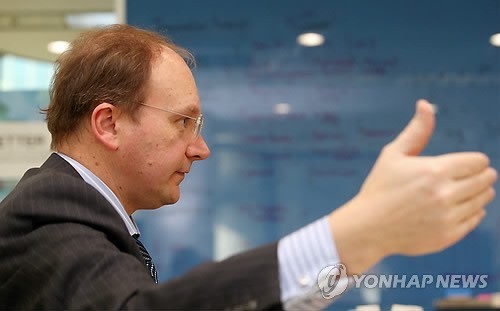European firms don’t trust Korea’s regulatory system
By Shin Ji-hyePublished : March 8, 2016 - 16:28
European companies doing business in Korea have little confidence in the nation’s legislative and regulatory system, according to a report released Tuesday.
The report, released jointly by the European Chamber of Commerce in Korea and consulting firm Roland Berger, was based on a survey of 139 European firms’ executives for two weeks in November. About 68 percent of the respondents have been doing business here for more than 10 years.
The respondents picked discretionary enforcement of regulations as the top obstacle in terms of Korea’s legislative and regulatory environment, with 53 percent of them showing dissatisfaction.
The report, released jointly by the European Chamber of Commerce in Korea and consulting firm Roland Berger, was based on a survey of 139 European firms’ executives for two weeks in November. About 68 percent of the respondents have been doing business here for more than 10 years.
The respondents picked discretionary enforcement of regulations as the top obstacle in terms of Korea’s legislative and regulatory environment, with 53 percent of them showing dissatisfaction.

Citing the Korean government’s constant change in the rules of special consumption tax last year, “We need to have a reliable (business) environment for stable pricing, system and marketing strategies,” ECCK secretary-general Christoph Heider said during a press meeting in Seoul.
“Although we may not leave the country immediately when the unpredictable regulatory environment persists, this can lead to revaluing doing business in Korea,” said Barbara Zollmann, secretary-general of the Korea-German Chamber of Commerce and Industry.
“(The need to improve system) is not limited to foreign companies because security is important even to Korean firms. But, foreign companies are much slower to adapt to change because they have to consult with their headquarters,” she added.
Apart from the legislative system, many European companies expressed concerns about labor costs. About 44 percent of the respondents said they feel negative about doing business in Korea in the next two years in terms of the rise in labor costs. Only 13 percent had a positive view on the subject.
Particularly, more than 70 percent responded that the automotive and financial services industries were most concerned about the outlook for labor costs over the next two years.
“Backed by strong labor unions, some employees take it for granted that wages rise regardless of business environment, growth rate and productivity,” said a European company chief, who declined to be identified.
Despite such concerns, many European companies view Korea as an important market because of potential growth, with 90 percent of the respondents saying the importance of the Korean market is either increasing or at the same level in their firms’ global strategy. About 57 percent of the respondents said they planned to expand their operations in Korea, compared to 49 percent in 2014.
By Shin Ji-hye(shinjh@heraldcorp.com)










![[Hello India] Hyundai Motor vows to boost 'clean mobility' in India](http://res.heraldm.com/phpwas/restmb_idxmake.php?idx=644&simg=/content/image/2024/04/25/20240425050672_0.jpg&u=)









